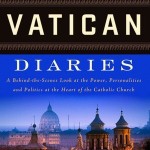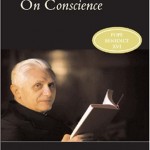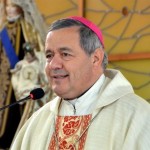Perhaps not. But I can’t help wondering about it.
On February 27, Joanne McPortland of Egregious Twaddle wondered whether a Pope Joseph I, inaugurated on the Feast Day of the Patron of the Universal Church might not be a wonderful thing for the church:
. . .if I were to whisper my wish, which is all any of us could do, I would hope the Spirit and the College of Cardinals would be leaning toward someone who combines the best of my two favorite popes:
—a man with the openness to the world’s hunger for Christ of a John XXIII, and a commitment to Christ’s Church as unshakable as that of Benedict XVI;
—a man with John XIII’s pastoral genius and air of being “one of us,” along with Benedict XVI’s steel in the face of the Enemy;
—a man who is capable of causing people to fall in love with the Church—as well as being open to drawing the lost ones home.In other words, we need an average Joe, with a twist. And I mean that literally. May the Holy Spirit give us a new St Joseph, guardian of the Church as he was of Mary and her Child—a father, a protector, a craftsman, a man in the world but not of it. It strikes me that the feast of St Joseph the Worker, March 19, may fall within the Conclave. What better time for the Holy Spirit to give us a pope with the gifts of those two Josephs—Roncalli and Ratzinger? And what better name might the new pope choose than Joseph?
I heard someone joke recently that the next pope should be John Paul Benedict I, a name encompassing the energy of every papacy since Good Pope John’s. It’s a silly idea, of course, and Joanne’s post was just an idea — a speculation of what a blessing for the church might look like — but, as with that joke, it is a speculation being made in hopes for the good of the church.
And here is Mahony, on March 3:
Since I was a seminarian, I have had a very personal devotion to St. Joseph. In God’s providence I was ordained a priest on May 1, 1962 the Feast of St. Joseph the Worker. Then, on March 19, 1975, the Feast of St. Joseph I was ordained a Bishop. Although all of this is just imaginary, it would be wonderful to celebrate the 38th anniversary of my episcopal ordination during the Inaugural Mass for our new Pope!
Okay, I don’t want to be too rough on Mahony — he has as much right, I guess, to indulge in whimsy as anyone else, and Lord knows, I do myself, sometimes — but as a Cardinal heading into conclave one would expect his thoughts and prayers to be primarly about what is best for the people of God and the Bride of Christ, and yet his whole idea of St. Joseph is how the great saint relates to him and his life. Then again, Mahony’s blog has lately been very me-centric — painfully so.
Recently I had three emails in a row asking me why I wasn’t spitting nails at Mahony’s participation in the conclave. I seem to spit fewer nails these days, in general (and I credit the Liturgy of the Hours for that, or maybe I’m just getting old…) but I’ve also more or less spelled out my thoughts about it here and elsewhere. How do I make sense of it? In the life of faith things don’t always make sense but today I keep reminding myself that the profane and the sacred have always stood right beside each other, just as Jesus hung between two sinners.
And, too, there is a part of me that looks at Mahony and thinks, “well, maybe we need him there, to keep ourselves rightly disgusted by all that has happened, and so as not to think we are anywhere near done with our penance. This is how I kept perspective regarding Cardinal Law, too, so I don’t see this as a left/right thing.
Mahony, if nothing else, is a reminder to us that the church is an institution that survives by the grace of the Holy Spirit, because if we were left to mere mere, it would have ceased to be, many centuries ago.
RELATED:
In other news, do you remember when I suggested that, in resigning, Benedict was doing something heroic, and meant to save the church? This piece out of England suggests that his resignation is a kind of martyrdom.
I take this all with a grain of salt, especially because the author, John Cromwell, says something everyone knows is false, not 50 words into the piece: “He had longed to be Pope. He has loved being Pope. He expected to die as Pope.”
Well, no. It is well-known that Joseph Ratzinger had bought a little house for himself in Bavaria and had every intention of retiring after guiding the 2005 conclave to its conclusion, and as for “expecting to die a pope,” to the contrary, Benedict had either hinted at or openly discussed the question of retirement several times during his papacy.
So, keep that caution in mind as you read this:
“. . .[Benedict] has voluntarily delivered himself up as a sacrificial lamb to purge the Church of what he calls ‘The Filth’. And it must have taken courage.
Here is the remarkable thing you are seldom told about a papal death or resignation: every one of the senior office-holders in the Vatican – those at the highest level of its internal bureaucracy, called the Curia – loses his job.
A report Benedict himself commissioned into the state of the Curia landed on his desk in January. It revealed that ‘The Filth’ – or more specifically, the paedophile priest scandal – had entered the bureaucracy.[…] Benedict was not prepared to wait for his own death to sweep out the gang who run the place. In one extraordinary gesture, by resigning, he gets rid of the lot of them. But what then?
The Curia are usually quickly reappointed. This time it may be different. It involves scores of departments, like the civil service of a middling-sized country.
It’s an interesting idea. I posited an idea that Benedict, having been (thanks to Twitter) given a birds-eye view of the world-hate directed at the church, in large part because of its sins. This article says it’s because of the scandals.
Sexual (and other) corruption or world-condemnation because of sexual (and other) corruption, they’re both part-and-parcel of the same thing. You don’t have to tell me twice that Benedict did something brave and heroic in resigning; I was already convinced.













